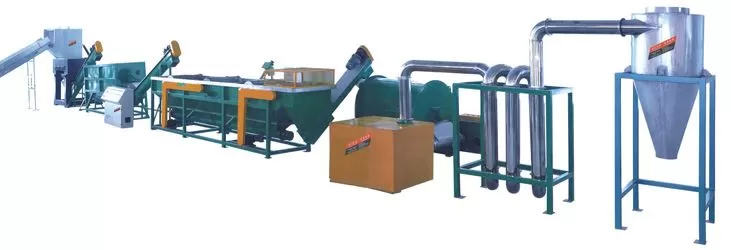Plastic waste is a global concern. Romania is no exception. Over recent years, Romania’s plastic waste management has drawn significant attention. The increase in plastic waste poses a substantial threat to the environment. Understanding Romania’s current situation and response measures is essential.

So, what efforts has Romania made in managing plastic waste? In short, Romania is actively implementing measures such as legislation, recycling programs, and public education to reduce plastic pollution. While progress is noticeable, many challenges remain.
Let’s delve deeper into Romania’s plastic waste management to see what we can learn.
What Are the Sources of Plastic Waste in Romania?
Romania’s plastic waste primarily comes from daily life and industrial production. Household single-use plastic items, like bags, bottles, and packaging materials, constitute a significant portion. Additionally, plastic waste generated during industrial production is also considerable.
Household Plastic Waste
In Romania, households use a large number of single-use plastic items. Plastic bags, bottles, and packaging materials are the main sources. These items are convenient to use but difficult to dispose of properly.
Industrial Plastic Waste
Industrial production also generates a substantial amount of plastic waste. This waste mainly comes from residual materials and defective products during the manufacturing process. Effectively managing this industrial waste is a significant challenge for Romania.
What Measures Has Romania Taken for Plastic Waste Management?
To address the growing problem of plastic pollution, Romania has implemented several measures. These include legislation, recycling programs, and public education initiatives.
Legislative Measures
The Romanian government has established various laws and regulations to reduce plastic waste production and promote recycling. For example, they have banned the use of single-use plastic items and encouraged the use of biodegradable materials.
Recycling Programs
Romania has also introduced several recycling programs to encourage public participation in plastic recycling. By setting up recycling points and providing incentives, the country’s plastic recycling rate has improved.
Public Education
Public education is another crucial component of Romania’s plastic waste management strategy. Through awareness campaigns, the government aims to raise environmental awareness among the public and reduce plastic waste generation.
What Challenges Does Romania Face in Plastic Waste Management?
Despite some progress, Romania still faces many challenges in managing plastic waste. These challenges include an underdeveloped recycling system, insufficient public awareness, and economic pressures.
Underdeveloped Recycling System
Romania’s plastic recycling system needs improvement. Although the government has introduced various recycling programs, practical issues remain. For example, there are not enough recycling points, and facilities are outdated.
Insufficient Public Awareness
Despite extensive awareness campaigns, public environmental awareness is still lacking. Many people have not yet developed the habit of actively recycling plastic waste, posing a significant challenge to waste management efforts.
Economic Pressures
Another major challenge in Romania’s plastic waste management is economic pressure. Plastic recycling and disposal require substantial funding. Balancing economic development with environmental protection is an ongoing issue for the Romanian government.
How Can Romania Improve Its Plastic Waste Management?
Improving Romania’s plastic waste management requires efforts from multiple stakeholders. The government, businesses, and the public should all actively participate in advancing waste management practices.
Government’s Role
The government should continue to strengthen legislation, improve the recycling system, and increase investment in plastic waste management. Additionally, it should enhance public education to raise environmental awareness.
Business Responsibility
Businesses also need to take more responsibility in managing plastic waste. This includes reducing the use of plastic packaging, developing biodegradable materials, and actively participating in plastic recycling.
Public Participation
The public should cultivate the habit of actively recycling plastic waste and reducing the use of single-use plastic items. Everyone can contribute to environmental protection.
The Role of International Cooperation in Plastic Waste Management
International cooperation plays a significant role in plastic waste management. By collaborating with other countries, Romania can learn from their advanced experiences and improve its own plastic waste management practices.
Learning from Experience
Through international cooperation, Romania can learn from the successful experiences of other countries in plastic waste management. For instance, Germany and Japan’s advanced recycling systems and technologies provide valuable lessons.
Technology Introduction
International cooperation can also help Romania introduce advanced plastic recycling and disposal technologies, enhancing its waste management capabilities.
Future Outlook
Looking ahead, Romania’s plastic waste management is expected to become more efficient and effective. With the combined efforts of the government, businesses, and the public, Romania is likely to make significant progress in managing plastic waste.
Policy Enhancement
In the future, the Romanian government will continue to strengthen legislation and improve policies related to plastic waste management, promoting recycling and disposal efforts.
Technological Innovation
With the advancement of technology, more sophisticated plastic recycling and disposal methods will be implemented, increasing the efficiency of plastic waste management.
Public Engagement
As environmental awareness continues to grow, the public will become more actively involved in plastic waste management, contributing to a cleaner environment.
Conclusion
Romania faces numerous challenges in managing plastic waste, but with collective efforts, the future is promising. Let’s work together to achieve a cleaner environment and better waste management practices!
